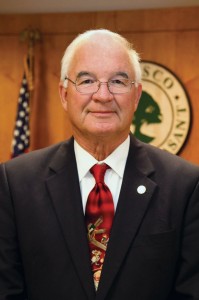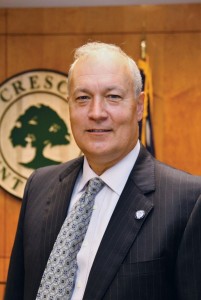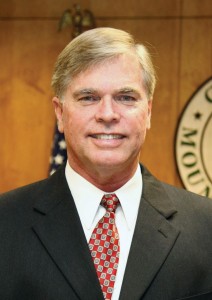
Bob Brimmer
Until 2015, Bob Brimmer showed little interest in the political arena, choosing instead to get involved in his adopted hometown by donating his time and talent in a variety of appointed positions. His decision to place his name on the crowded Council ballot was based on his belief that he could do more to make Mount Pleasant a better place to live, work and play.
“There was a disconnect between what the Town Council was doing and what the public was saying,” he explained. “It concerned me. I wanted to bridge that disconnect.”
The top recipient of votes in the Nov. 3 election, Brimmer said much of his support came from people who agreed with the direction he followed during his six years on the town’s Planning Commission.
“Those folks were aware of my votes and decisions. That’s what attracted them to me,” he remarked.
A native of upstate New York who moved south to earn a bachelor’s degree in Psychology at Lander College in Greenwood, South Carolina, Brimmer has served on the town’s Comprehensive Plan Steering Committee and two blue ribbon education committees. He said his 15 years of service to Mount Pleasant gave him the experience to move seamlessly into his seat on the Council.
“I had a front row seat to development issues, what we were doing right and what we could do better,” he commented, adding that he was ready to “take public service to another level.”
Brimmer, who serves as a regional director for the state Department of Social Services, insisted that the recent election, which produced four new councilmen, was not simply a battle between “no growth and pro growth.” He said the campaign was more about how quickly the town’s population will expand, what type of development will be permitted and whether Mount Pleasant’s infrastructure – its roads, water and sewage systems and other critical services – will be able to keep pace with its growth.
“We’re going to grow,” he said. “This is a desirable community. But we need responsible, balanced growth, and Mount Pleasant’s future needs to be decided by Mount Pleasant, not by outside forces.”
According to Brimmer, in the past, the Council has been too “development friendly,” granting variances to the town’s Comprehensive Plan and rezoning too much property from commercial to residential.
“There will be fewer exceptions, and the town will stick closer to the rules,” he commented. “Residential and commercial development have to be balanced.”
Brimmer, who earned his master’s in Higher Education/Counseling Psychology at James Madison University and has lived in the Lowcountry for 25 years and in Park West in Mount Pleasant since 2003, pointed out that he is not opposed to high-density residential development. He said he would like to see Coleman Boulevard serve as Mount Pleasant’s main street, with taller buildings and more density on Johnnie Dodds Boulevard.
He added that increasing the capacity of Highway 41 will be a priority for the new Council.
Brimmer and his wife, Dianne, have been married for 23 years. Their daughter, Haley, is a senior at Clemson University, while their son, Alec, is a junior at Wando High School.

Joe Bustos
Joe Bustos’ message is much as the same as it was during his first stint as a Mount Pleasant councilman: Growth is not a problem; uncontrolled growth is.
“The situation is similar: crowded schools, lots of traffic and people wanting things to slow down a bit,” said Bustos, who served on the Council from 2000 to 2009 and reclaimed his seat in November. “I don’t think we’re in a bad place right now, but we will be soon if we don’t take action.”
Bustos grew up in Mount Pleasant and graduated from Moultrie High School in 1968. He earned an undergraduate degree from Columbia College and a master’s from Central Michigan University and spent 24 years in the U.S. Army, reaching the rank of Lieutenant Colonel. His military career took him to places as diverse as New Jersey, Georgia, Kansas and Korea, but picking a place to retire was an easy decision for Bustos and his wife, Kathy, a graduate of Bishop England High School. They returned home in 1995.
“We looked around and couldn’t think of a better place to live than Mount Pleasant,” he said.
An unsuccessful candidate for the post of mayor of Mount Pleasant in 2009 and again in 2013, Bustos said he ran his entire Council campaign for around $3,000 of his own money.
“I didn’t want to be beholden to anyone,” he explained. “If you take money, you will feel obligated. People expect things when they give you money.”
He explained that he and his wife “walked a lot, used social media, visited folks in their homes and sent emails. That’s how we campaigned.”
Bustos, who worked as a stockbroker after leaving the Army, found his retirement job at the Mount Pleasant Regional Airport. He learned to fly at the age of 53 and enjoyed his time in the air so much that he earned his instrument rating and commercial license and now teaches others to “slip the surly bonds of Earth.”
Bustos said he was a supporter of preserving the charm of Shem Creek even before the recent controversy over the construction of an office building and parking garage near the iconic waterway. When he chaired the Planning Committee during his previous term on the Council, he helped establish the Shem Creek Overlay District and spearheaded the town’s purchase of 40 acres of land that is now home to Shem Creek Park.
“There have been plans to build condos and a marina on the creek, which would have squeezed out what was left of the shrimp boats,” he remarked.
In Bustos’ mind, the town of Mount Pleasant would be better off pushing economic rather than residential development, in part because businesses pay taxes and other fees but put little strain on services provided by the town.
“We need real economic development so people can live here and work here,” he commented. “Creating 50 or 60 minimum wage jobs is not economic development.”
The Bustos’ have a daughter, Kelly, and a son, Brian, and grandson Nathan.

Will Haney
For three years of his life, Will Haney was a student at East Cooper School, a now-defunct educational institution housed in a building that later became part of Mount Pleasant’s Town Hall. He’ll be spending a lot of time on that same campus, but instead of learning to read, write, add and subtract, he’ll be making decisions that affect the future of one of the fastest-growing municipalities in the country.
Haney, a writer, newspaper columnist and public relations and marketing consultant, was successful in his first-ever political campaign in November, claiming a seat on the Mount Pleasant Town Council by finishing in the top two in a three-way runoff. His prior political experience was as press secretary from 2000 to 2002 for then U.S. Rep. Charles H. Taylor of North Carolina.
Haney said he entered the Council race, at the urging of his wife, Suzette, to provide a voice for the people of Mount Pleasant.
“The townspeople did not have as much influence as the developers and outside organizations,” he said. “If it’s not true that a person who owns a modest house in Mount Pleasant doesn’t have as much access and voice as a person who owns an expensive home, we’re not the democracy I thought we were.”
Haney, who came out on top in 31 of 39 precincts in the runoff, said one of his priorities in his new job would be to make sure developers are required to abide by the town’s building regulations.
“Why do our ordinances appear to be so negotiable?” he asked. “We’re going to stick to the guiding documents and regulations we have, things like commercial property not being rezoned to high-density multifamily. This is not a no-growth scenario. It’s a compatible growth scenario.”
According to Haney, the Mount Pleasant election was all about the town’s ever-expanding population. He pointed out that the previous Council passed a growth management plan two weeks before voters went to the polls, “too late to convince the public that slowing growth was a priority.”
“Our rate of growth is not a matter of opinion any more,” he remarked.
Haney moved to Mount Pleasant at the age of 5, went to high school in Sumter, returned to Mount Pleasant for a while in 1987 then on a permanent basis in 2010. Expanding on ideas he broached in columns for two newspapers in Western North Carolina, he published a book titled, “When My Cellphone Blinks ‘Roam,’ Do I Have a Call from Italy?”
Haney, who in 1983 earned a degree in Business Administration at The Citadel, where he was the top-ranking cadet at the military academy, is working on a second book, this one about Col. Harvey M. Dick, former assistant commandant of cadets at the school.
Haney and his wife, Suzette, a teacher at Jennie Moore Elementary School in Mount Pleasant, have a blended family that includes two sons and two daughters.

Jim Owens
Jim Owens, who has spent his entire life in the Lowcountry, thinks he has a lot to offer to the place he calls home. A licensed construction manager, utility contractor and real estate agent, he has a good idea about how to help manage the future of one of the fastest-growing towns in the United States.
“I know what infrastructure should look like,” said Owens, who culminated his first political campaign by claiming a seat on the Mount Pleasant Town Council in November’s runoff election.
During his career, Owens has worked on projects including Daniel Island’s infrastructure, the Mount Pleasant Memorial Waterfront Park, the Center for Advanced Studies on the Wando High School campus and the utility infrastructure at Mount Pleasant Regional Airport.
Owens, who graduated from Wando High School and attended the College of Charleston and Trident Technical College, said he launched his political career because “It’s something I always wanted to do.” He added that he had been attending Council meetings for about two years and was concerned that local residents had only two minutes to speak about what he considered to be serious issues.
He actually waded into the local political scene in October 2014 as a founding member of Save Shem Creek, after establishing a Facebook page aimed at opposing the construction of an office building and parking garage at the corner of Mill Street and Coleman Boulevard, not far from the creek.
“We don’t need to negate what made Shem Creek so great to people who settled here initially,” Owens commented.
He suggested that it might be a good idea to consider other options besides an office building near the north side of the creek, including a museum, an open-air market or a park.
Will the results of November’s election bring drastic changes to the way land is developed in Mount Pleasant? Owens insisted that the town will continue to grow, “but at a steady and reasonable rate.” He said he wants to eliminate many of the special exceptions that have been granted to developers by the Council in recent years.
“We will review the growth management plan. We’ll see what needs to be done and make adjustments to the plan,” Owens commented. “I don’t think we should allow development that impacts residents in a negative way.”
He added that he is optimistic about the future of Mount Pleasant.
“I know our best days are ahead, and I’ll do everything in my power to make sure that takes place,” he said. “I can’t imagine growing up in an area that has a sense of community like Mount Pleasant. My friends in those days are my lifelong friends today.”
Jim and Lydia Owens have been married for 14 years; their blended family includes five children.
By Brian Sherman.
Photos by Rick Walo.

Leave a Reply